Dear Zazie, Here is today’s Lovers’ Chronicle from Mac Tag dedicated to his muse. Rhett
The Lovers’ Chronicle
Dear Muse,
© copyright 2020 mac tag/cowboy coleridge all rights reserved
© copyright 2019 mac tag/cowboy coleridge all rights reserved
we move across the floor
riveted together,
limb for limb
the music breaks
over us in crescendos
as we maneuver,
two as one
as in all things
that we do
“Does she know
you love her?”
of course
that is why i do,
because she knows
she is the only one
who has ever known
© copyright 2018 mac tag/cowboy coleridge all rights reserved
how do you figure,
well you cannot
there ain’t no figurin’
when somethin’ good
comes along
you gotta roll with it
where is it gonna go
who the hell knows
but answer me this,
you got somethin’
better to do
…exactly
do you remember
what your hands are for
why you started sketchin’
why you began writin’ verse
do you remember
the best use of your heart
© copyright 2017 mac tag/cowboy Coleridge all rights reserved
1827 – Bellini’s third opera, Il pirata, is premiered at Teatro alla Scala di Milano.
| Il pirata | |
|---|---|
| Opera by Vincenzo Bellini | |

Rubini as Gualtiero in the premiere production
|
|
Il pirata (The Pirate) is an opera in two acts by Vincenzo Bellini to an Italian libretto by Felice Romani which was based on a three-act mélodrame from 1826, Bertram, ou le Pirate (Bertram, or The Pirate) by Charles Nodier and “Raimonde” (actually Isidore Justin Séverin Taylor). This play was itself based upon a French translation of the “five-act verse tragedy” Bertram, or The Castle of St Aldobrando by Charles Maturin which appeared in London in 1816.
The original play has been compared with Bellini’s opera and the influence of Il pirata on Gaetano Donizetti’s Lucia di Lammermoor has been noted.


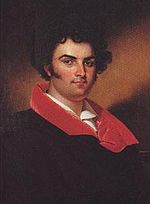
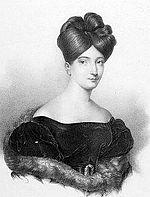
| Sigrid Hjertén | |
|---|---|

Sigrid Hjertén at work
|
|
Today is the birthday of Sigrid Hjertén (Sundsvall 27 October 1885 – 24 March 1948 Stockholm); modernist painter. She worked as an artist for 30 years before dying of complications from a botched lobotomy for schizophrenia.
Ateljéinteriör (Studio interior) from 1916 shows how radical Hjertén was for her time. The painting describes the roles she played as artist, woman, and mother: different identities in different worlds. Hjertén sits on the sofa between two artists – her husband, Isaac Grünewald, and, perhaps, Einar Jolin – who talk to each other over her head. Her large blue eyes stare into the distance. In the foreground a woman dressed in black – a sophisticated alter ego – leans against a male figure who might be the artist Nils von Dardel. Her son Ivàn crawls out of the right-hand corner. In the background we glimpse one of Hjertén’s paintings of the period, Zigenarkvinna (Gypsy woman). Studio Interior and Den röda rullgardinen (The red blind), from 1916, have given rise in recent years to new interpretations based on contemporary gender studies and reveal information about the artist’s private life.
Gallery
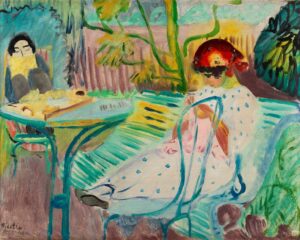
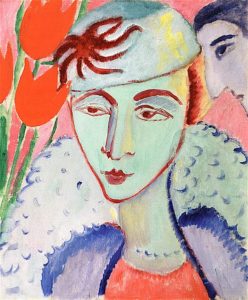
Decorative Head
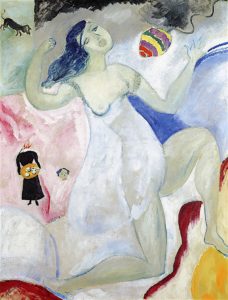
Nightmare
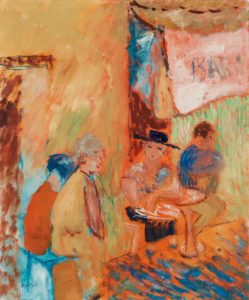
“Le Bar du Marin ” 1930
| Dylan Thomas | |
|---|---|

Thomas at the Gotham Book Shop,
in New York City, 1952 |
Today is the birthday of Dylan Marlais Thomas (Uplands, Swansea, Glamorgan, Wales 27 October 1914 – 9 November 1953 New York City); poet and writer whose works include the poems “Do not go gentle into that good night” and “And death shall have no dominion”; the ‘play for voices’ Under Milk Wood; and stories and radio broadcasts such as A Child’s Christmas in Wales and Portrait of the Artist as a Young Dog. He became widely popular in his lifetime and remained so after his premature death at the age of 39 in New York City. By then, he had acquired a reputation, which he had encouraged, as a “roistering, drunken and doomed poet”. Many of his works appeared in print while he was still a teenager; however, it was the publication of “Light breaks where no sun shines,” in 1934, that caught the attention of the literary world.
While living in London, Thomas met Caitlin Macnamara, whom he married in 1937. Their relationship was defined by alcoholism and apparently was mutually destructive.
Thomas first traveled to the United States in the 1950s. This is where his readings brought him a level of fame while his erratic behaviour and drinking worsened. His time in America cemented Thomas’s legend. During his fourth trip to New York in 1953, Thomas became gravely ill and fell into a coma, from which he never recovered. His body was returned to Wales where he was interred at the village churchyard in Laugharne on 25 November 1953.
Though Thomas wrote exclusively in the English language, in my opinion, he is one of the most important Welsh poets of the 20th century. He is noted for his original, rhythmic and ingenious use of words and imagery. Thomas’s position as one of the great modern poets has been much discussed, and his popularity remains.
Verse
- Light breaks where no sun shines;
Where no sea runs, the waters of the heart
Push in their tides;
And, broken ghosts with glow-worms in their heads,
The things of light
File through the flesh where no flesh decks the bones.- “Light Breaks Where No Sun Shines”, st. 1 (1934), st. 1
- Dawn breaks behind the eyes;
From poles of skull and toe the windy blood
Slides like a sea;
Nor fenced, nor staked, the gushers of the sky
Spout to the rod
Divining in a smile the oil of tears.- Light Breaks Where No Sun Shines, st. 1 (1934), st. 3
- Light breaks on secret lots,
On tips of thought where thoughts smell in the rain;
When logics die,
The secret of the soil grows through the eye,
And blood jumps in the sun;
Above the waste allotments the dawn halts.- Light Breaks Where No Sun Shines, st. 1 (1934), st. 5)
- When all my five and country senses see,
The fingers will forget green thumbs and mark
How, through the halfmoon’s vegetable eye,
Husk of young stars and handfull zodiac,
Love in the frost is pared and wintered by.- “When All My Five And Country Senses See” (1939)
- They shall have stars at elbow and foot;
Though they go mad they shall be sane,
Though they sink through the sea they shall rise again;
Though lovers be lost love shall not;
And death shall have no dominion.- “And Death Shall Have No Dominion”, st. 1 (1943)
- After the first death, there is no other.
- “A Refusal To Mourn The Death, By Fire, Of A Child In London”, st. 4 (1946))
- Do not go gentle into that good night,
Old age should burn and rave at close of day;
Rage, rage against the dying of the light.- “Do Not Go Gentle into that Good Night” (1952)
Fern Hill (1946)
- Now as I was young and easy under the apple boughs
About the lilting house and happy as the grass was green,
The night above the dingle starry,
Time let me hail and climb
Golden in the heydays of his eyes.
And honoured among wagons I was prince of the apple towns.- St. 1
- In the sun that is young once only,
Time let me play and be
Golden in the mercy of his means.- St. 2
- And the sabbath rang slowly
In the pebbles of the holy streams.- St. 2
- And honoured among foxes and pheasants by the gay house
Under the new made clouds and happy as the heart was long,
In the sun born over and over,
I ran my heedless ways.- St. 5
- Time held me green and dying
Though I sang in my chains like the sea.- St. 6
And death shall have no dominion.
Dead men naked they shall be one
With the man in the wind and the west moon;
When their bones are picked clean and the clean bones gone,
They shall have stars at elbow and foot;
Though they go mad they shall be sane,
Though they sink through the sea they shall rise again
Though lovers be lost love shall not;
And death shall have no dominion.
From “And death shall have no dominion”
Twenty-five Poems (1936)
Not for the proud man apart
From the raging moon I write
On these spindrift pages
Nor for the towering dead
With their nightingales and psalms
But for the lovers, their arms
Round the griefs of the ages,
Who pay no praise or wages
Nor heed my craft or art.
From “In my Craft or Sullen Art”
Deaths and Entrances, 1946
| Sylvia Plath | |
|---|---|
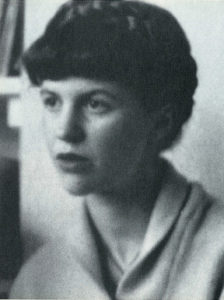
Plath in 1961
|
|
And today is the birthday of Sylvia Plath (Boston October 27, 1932 – February 11, 1963 London); in my opinion, one of the most renowned and influential poets, novelists, and short story writers of the 20th century. She was married to fellow poet Ted Hughes from 1956 until they separated in September 1962. They lived together in the United States and then England and had two children. Plath was clinically depressed for most of her adult life. She committed suicide in 1963.
Plath is credited with advancing the genre of confessional poetry and is best known for her two published collections, The Colossus and Other Poems, and Ariel. She also wrote The Bell Jar, a semi-autobiographical novel published shortly before her death. In 1982, she won a posthumous Pulitzer Prize for The Collected Poems.
Verse
- How frail the human heart must be —
a mirrored pool of thought.- “I Thought I Could Not Be Hurt,” quoted in the introduction to Letters Home: Correspondence 1950–1963 (1975) as Plath’s first poem, written at age 14
- I shut my eyes and all the world drops dead;
I lift my lids and all is born again.- “Mad Girl’s Love Song” (1953) from Collected Poems (1981)
- What did my fingers do before they held him?
What did my heart do, with its love?- “Three Women: A Poem for Three Voices” (1962), a radio play published in 1968
The Colossus (1960)
- So many of us!
So many of us! - We are shelves, we are
Tables, we are meek,
We are edible, - Nudgers and shovers
In spite of ourselves.
Our kind multiplies: - We shall by morning
Inherit the earth.
Our foot’s in the door.- “Mushrooms”
The Bell Jar (1963)
- “It’s a tango.” Marco maneuvered me out among the dancers. “I love tangos.” “I can’t dance.” “You don’t have to dance. I’ll do the dancing.” Marco hooked an arm around my waist and jerked me up against his dazzling white suit. Then he said, “Pretend you are drowning.” I shut my eyes, and the music broke over me like a rainstorm. Marco’s leg slid forward against mine and my leg slid back and I seemed to be riveted against him, limb for limb, moving as he moved, without any will or knowledge of my own, and after a while I thought, “It doesn’t take two to dance, it only takes one,” and I let myself blow and bend like a tree in the wind. “What did I tell you?” Marco’s breath scorched my ear. “You’re a perfectly respectable dancer.”
- Ch. 9
- “Does she know you love her?” “Of course.” I paused. The obstacle seemed unreal to me. “If you love her,” I said, “you’ll love somebody else someday.”
- Ch. 9
- When they asked some old Roman philosopher or other how he wanted to die, he said he would open his veins in a warm bath. I thought it would be easy, lying in the tub and seeing the redness flower from my wrists, flush after flush through the clear water, till I sank to sleep under a surface gaudy as poppies. But when it came right down to it, the skin of my wrist looked so white and defenseless that I couldn’t do it. It was as if what I wanted to kill wasn’t in that skin or the thin blue pulse that jumped under my thumb, but somewhere else, deeper, more secret, and a whole lot harder to get at.
- Ch. 12
Ariel (1965)
- Now your head, excuse me, is empty.
I have the ticket for that.
Come here, sweetie, out of the closet.
Well, what do you think of that?
Naked as paper to start - But in twenty-five years she’ll be silver,
In fifty, gold.
A living doll, everywhere you look.
It can sew, it can cook,
It can talk, talk, talk. - It works, there is nothing wrong with it.
You have a hole, it’s a poultice.
You have an eye, it’s an image.
My boy, it’s your last resort.
Will you marry it, marry it, marry it.- “The Applicant”
- Dying
Is an art, like everything else.
I do it exceptionally well.- “Lady Lazarus”
- Herr God, Herr Lucifer,
Beware.
Beware. Out of the ash
I rise with my red hair
And I eat men like air.- “Lady Lazarus”
- I am inhabited by a cry.
Nightly it flaps out
Looking, with its hooks, for something to love. - I am terrified by this dark thing
That sleeps in me;
All day I feel its soft, feathery turnings, its malignity.- “Elm”
- I am incapable of more knowledge.
What is this, this face
So murderous in its strangle of branches? — - Its snaky acids hiss.
It petrifies the will. These are the isolate, slow faults,
That kill, that kill, that kill.- “Elm”
- This is the light of the mind, cold and planetary.
The trees of the mind are black. The light is blue.- “The Moon and the Yew Tree”
- The moon is no door. It is a face in its own right,
White as a knuckle and terribly upset.
It drags the sea after it like a dark crime; it is quiet
With the O-gape of complete despair. I live here.- “The Moon and the Yew Tree”
- You do not do, you do not do
Any more, black shoe
In which I have lived like a foot
For thirty years, poor and white,
Barely daring to breathe or Achoo.- “Daddy”
- There’s a stake in your fat black heart
And the villagers never liked you.
They are dancing and stamping on you.
They always knew it was you.
Daddy, daddy, you bastard, I’m through.- “Daddy”
- Darling, all night
I have been flickering, off, on, off, on.
The sheets grow heavy as a lecher’s kiss.- “Fever 103”
- Perfection is terrible, it cannot have children.
- “The Munich Mannequins”
- The blood jet is poetry,
There is no stopping it.- “Kindness”
- The woman is perfected
Her dead - Body wears the smile of accomplishment,
The illusion of a Greek necessity - Flows in the scrolls of her toga,
Her bare - Feet seem to be saying:
We have come so far, it is over. - Each dead child coiled, a white serpent,
One at each little - Pitcher of milk, now empty.
She has folded - Them back into her body as petals
Of a rose close when the garden - Stiffens and odors bleed
From the sweet, deep throats of the night flower. - The moon has nothing to be sad about,
Staring from her hood of bone. - She is used to this sort of thing.
Her blacks crackle and drag.- “Edge”
- Axes
After whose stroke the wood rings,
And the echoes!
Echoes travelling
Off from the centre like horses.- “Words”
Crossing the Water (1971)
- These hills are too green and sweet to have tasted salt.
I follow the sheep path between them. A last hook brings me
To the hills’ northern face, and the face is orange rock
That looks out on nothing, nothing but a great space
Of white and pewter lights, and a din like silversmiths
Beating and beating at an intractable metal.- “Blackberrying”
- These poems do not live: it’s a sad diagnosis.
They grew their toes and fingers well enough,
Their little foreheads bulged with concentration.
If they missed out on walking about like people
It wasn’t for any lack of mother-love.- “Stillborn”
- Now I am a lake. A woman bends over me,
Searching my reaches for what she really is.
Then she turns to those liars, the candles or the moon.
I see her back, and reflect it faithfully.
She rewards me with tears and an agitation of hands.
I am important to her. She comes and goes.
Each morning it is her face that replaces the darkness.
In me she has drowned a young girl, and in me an old woman
Rises toward her day after day, like a terrible fish.- “Mirror”
- I’m a riddle in nine syllables,
An elephant, a ponderous house,
A melon strolling on two tendrils.
O red fruit, ivory, fine timbers!
This loaf’s big with its yeasty rising.
Money’s new-minted in this fat purse.
I’m a means, a stage, a cow in calf.
I’ve eaten a bag of green apples,
Boarded the train there’s no getting off.- “Metaphors”
Winter Trees (1972)
- You said you would kill it this morning.
Do not kill it. It startles me still,
The jut of that odd, dark head, pacing - Through the uncut grass on the elm’s hill.
It is something to own a pheasant,
Or just to be visited at all. - I am not mystical: it isn’t
As if I thought it had a spirit.
It is simply in its element. - That gives it a kingliness, a right.
- “Pheasant”
And I
Am the arrow,
The dew that flies
Suicidal, at one with the drive
Into the red
Eye, the cauldron of morning.
from the poem Ariel, October 12, 1962
Mac Tag

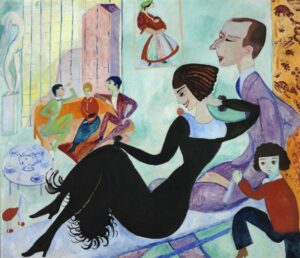
No Comments on "The Lovers’ Chronicle 27 October – the reason – premiere of Bellini’s Il Pirata – art by Sigrid Hjertén – verse by Dylan Thomas & Sylvia Plath"